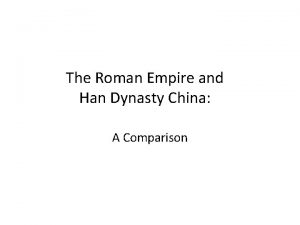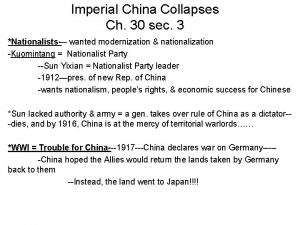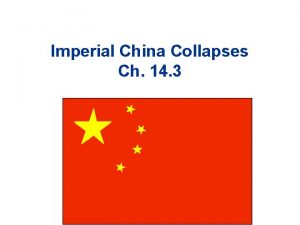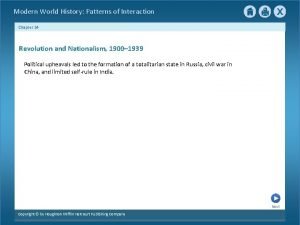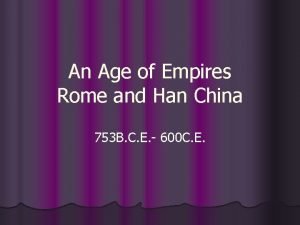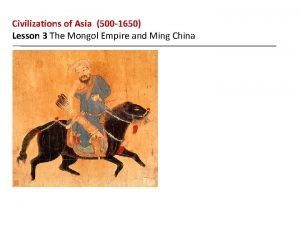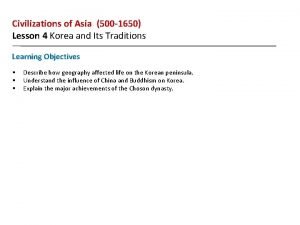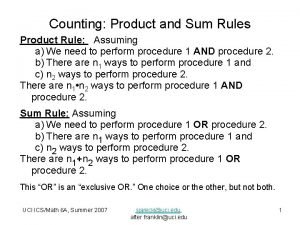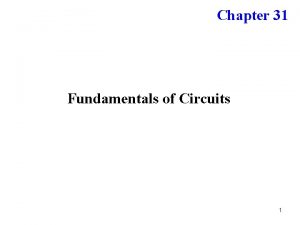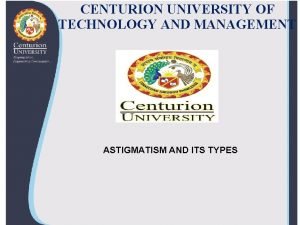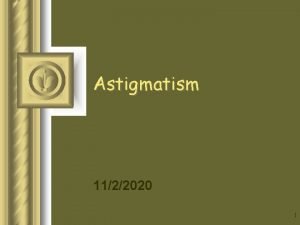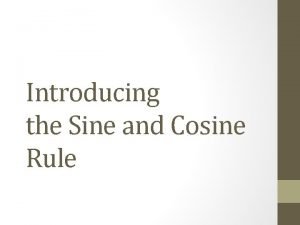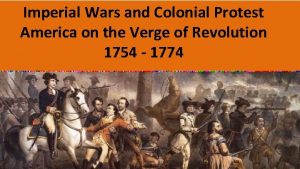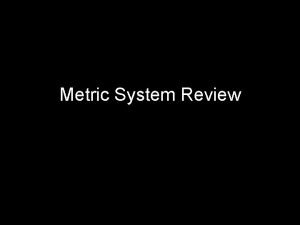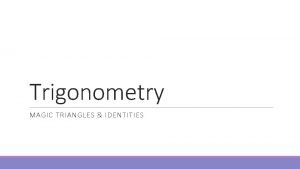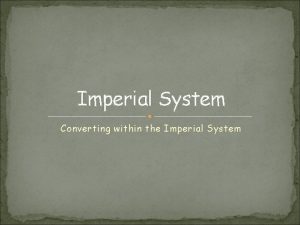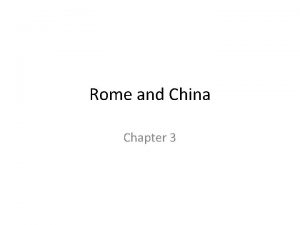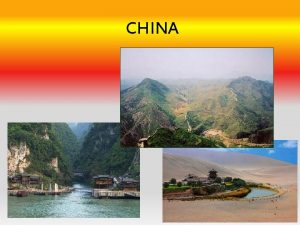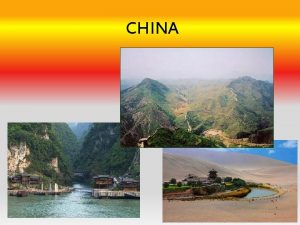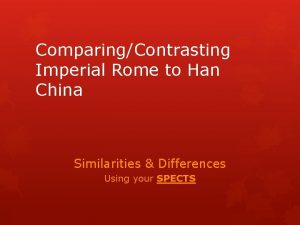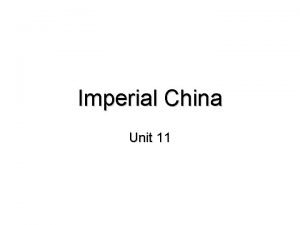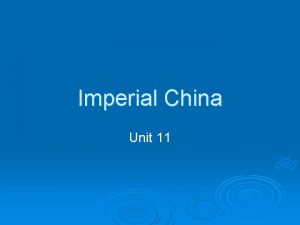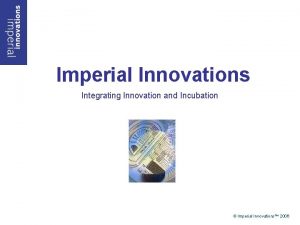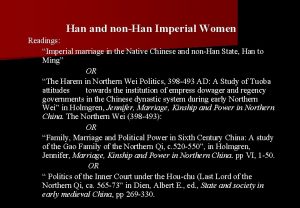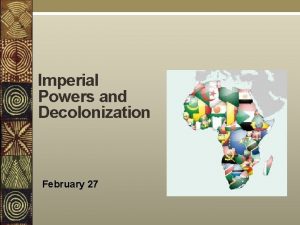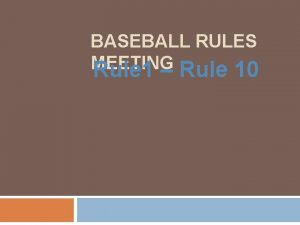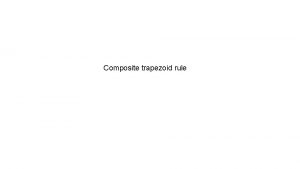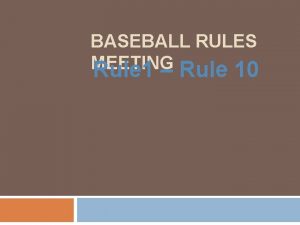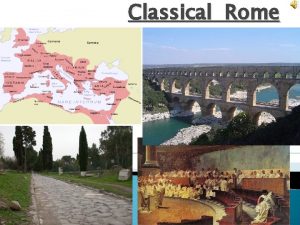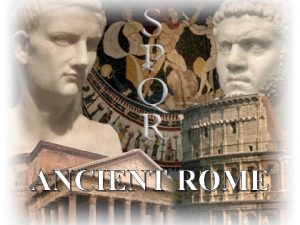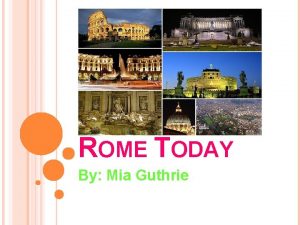Imperial Rule in Rome and China On Rome




















- Slides: 20

Imperial Rule in Rome and China

‘On Rome’ What made this civilization so enduring in the history of the world? • politics and government • the Republic • bureaucracy • art and architecture • infrastructure and engineering • law and order • Destiny • ‘to spare the conquered and put down the proud’ • Empire • A Republic built on War and Order? Why do we study Roman civilization? • to discover something of ourselves & our societies? Why Rome? Why not another city-state – that created a polity around all sides of the sea, uniting most of Europe and the entire north African coast with the lands of ancient empires in the Middle East?

The Rise of Rome • Key features of Italian geography that effect Rome? • • • Mediterranean location Proximity to the sea Communications between Greece & North Africa Climate? Agrarian potential? Etruscans (c. 750 BC) • Where from? • Asia Minor? • Artisans, traders • Buried their dead in tombs • Much learned from these…. • Greek city-states & Carthage (N. Africa) • conflict limits/restricts expanse • Confederacy • Symbols of authority Rome inherit • the fasces

A Republic Built on War and Law • The starting point was conquest, as with most empires. • Romulus – abandoned as a baby to die, nursed to life by a wolf – extolled hardiness, valor, daring, fidelity, and combat as primary virtues. Romulus was said to have killed his own brother (Remus), and a conflict within the political elite would be an ordinary part of Roman life. • 500 BCE – Romans replaced their king with a republic – • ruled by elected representatives. • No incompatibility between empire and republican government • Romans conquered and incorporated tribes, cities, and kingdoms in Italy, and later moved on beyond their core area. The centuries of conquest included near defeats, inspired loyalty, and embedded military values deeply in the institutions and spirit of the empire. • As Romans took over more and more places and people, they adjusted their institutions to the tasks of ruling an imperial capital city and distant places.

Checks and Balances Assemblies • Senate • Particians (nobility) • Comitia Centuriata • segregated by wealth • Comitia Curiata • Comitia Tributa • Concilium Plebis • plebiscites Magistrates • Consuls • Dictator • Praetors • Judges • Censors • Responsible for Citizenry • Aediles • Public works • Quaestors • Finance

Always Annoying John Green - On Republican Rome - https: //www. youtube. com/watch? v=o. Pf 27 g. Aup 9 U

Institutions for Empire Imperium – first referred to the king’s power to impose execution or beatings, to draft citizens into armies, and to command armies on campaigns…. that power was transferred to the consuls under the republic – tight connections in governance between military and civil matters. Praetor – (circa 241 BCE) created to expand military and judicial command over new areas and to deal with legal matters between Romans and conquered people. • Innovations in government created by the Romans echo in our political vocabulary – patrician, plebian, noble – these concepts configured ways of thinking about status – senates and committees are still with us…. . magistrates, tribunals, consuls evolved. • To govern outside their capital, Romans developed strategies that would enter the repertoires of later empire-builders. One of these was the enlargement of the sphere of Roman rights…. • By the time the Romans completed their conquest of Italy, they had produced three different ways of attaching land people to their empire: I. annexation, limited citizenship, and eventual assimilation for nearby Latins, II. limited self-government for some non-Latin cities and tribes, and III. colonies of Latins displaced to frontier regions. • Law and Government – Government, from Rome’s perspective, was mostly about collecting taxes, either as money or produce, mobilizing soldiers, and sustaining the infrastructure – roads, aqueducts – that kept the empire together……legal pluralism evolved…. . civil laws…. . Romans were good at ‘incorporative activities. ’

Roman Law Two basic principles: i) Law must be recorded ii) Justice could not be left to judges alone The Twelve Tables (c. 450 BCE) • promoted the public prosecution of crime • enacted a system of victim compensation • protected the lower class (plebeians) from abuse by ruling class (patricians) ‘legal advisers’ – a person accused of a crime could seek out legal advice. This practice of having an adviser who specializes in the law first became prevalent during Roman times. By 100 CE, the Romans had a sophisticated and complex society, and the Roman Empire had spread throughout most of Europe. Society became even more complex, and more laws were devised to decide such matters as what constituted criminal behaviour, how contracts should be regulated, and how everyday disputes with citizens could be resolved. Justinian’s Code – The word ‘justice’ is derived from Emperor Justinian’s (527 -565 CE) name. This code formed the basis of civil law (laws governing personal relationships).

The Punic Wars (c. mid 3 rd century BC) • Rome v. Carthage Rome’s greatest? • 264 BC – Clashes over Sicily • How to govern? Roman governor? • Carthaginians occupies Spain (Iberia) • Hannibal • land based invasion of Italy from Spain……War Elephants! • bloody battles, significant Roman losses • Cannae – 50 000 Roman soldiers dies in one day • Romans adapt – guerilla warfare • Scipio Africanus • Hero of the Punic Wars? • Defeats Hannibal in Spain, Siciliy, Tunisia • Carthage weakened – treats with Rome • Numidians fearful of Carthage – Rome razes, burns Carthage ‘We have made a desert and called it peace’ How does Rome’s conflict with Carthage contribute to their expansion?

Aftermath of the Punic War Roman (& Italian) Society Divided • Rich v. Poor • Free v. Slave • Citizen v. Noncitizen • Soldier v. Civilian Gracchus Brothers (c. 133 BC-123 BC) • Reform? • Break up the Estates • Divide land among the poor • Murdered……recurring theme in Rome’s politics The Generals • Gaius Marius……his rival was that of Cornelius Sulla • Evolution of the Roman Army (influence, as well) • problem of land supply…. . leads to standing (‘professional’) army • fixed term of service – 16 yrs + 4 yr veteran = pension, gratuity, plot of land • loyalty to Generals rather than Rome…. . • Civil War • Generals execute political opponents in the Senate First Triumvirate (to 53 BC) – ‘Rule of Three Men’ • Gnaeus Pompey (106 -48 BC) • M. Licinius Crassus (115 -53 BC) • G. Julius Caesar (100 -44 BC)

Pompey and Caesar: Rivals for Political Power • Civil War (yeah, again…. ) • Caesar prevails (c. 45 BC) • Senate fearful of Caesar’s military power…. • Dictator for life…. unconstitutional and unprecedented? Nah. • settles veterans to the colonies…. . • Reformer? • ‘softened’ Rome’s rule in colonies – ‘citizenship’ & ‘tax burden’ • Julian Calendar • Death of Caesar • Et tu, Brutus? • Civil War (OMG, really…. ) • The Second Triumvirate (43 -32 BC) • Mark Antony • Octavian (Caesar’s son) • Marcus Lepidus • *** Sextus Pompey • Mark Antony And Cleopatra (of Egypt) • Mark Antony already married to Octavius’ sister • ‘a passionate and troubled affair…. . ’

Order from Chaos…. the Empire gets an Emperor Augustus (63 BC-14 AD) • born Octavian, later adopted by Julius Caesar… • Allying with Mark Antony, they divide the empire, but…. . Cleopatra!! • Octavian defeats Egyptian fleet, becomes hero of Rome • Expands empire, but shrewd politician at home in Rome • Restores the ‘Republic’ (really, just pretending) • Augustus accumulates enormous fortune from plunder, gifts, taxes, and revenues from his personal estates and from provinces under imperial control…. . ’patrimonium’ • Emperor’s power was the military, but a double-edged sword? • Augustus kept the link between citizenship and military service – for the most part, the standing army was to be composed of citizens – but moved troops, with their generals, out of Italy and to the border zones. • A new elite corps – the Praetorian guard – protected the emperor. Augustus also created a standing navy…. . In principle, the emperor as the sole, life-long military commander controlled the whole, but this principle was often turned on its head. • this system, its multiple legitimating institutions, the ethos of military glory – these were a recipe for regicide.

Pax Romana (Roman Peace) • Taxation was the key to the whole operation. The Romans taxed land, persons, inheritances, slave owning, imports, and exports. The famous Roman censuses were taken with tax collecting as a goal. • Functionally, the empire was a huge economic space, fostered by peace, security, and political unity. The whole was essential to the well-being of its parts. Africa, Sicily, Sardinia, and Egypt provided grain for Rome; Gaul, the Danube, and the Balkans fed the army; and Italy, Spain, the south of Gaul, and Anatolia – all commercially active areas – paid their taxes in money, which was used to compensate soldiers and officials. • It took a very long time – hundreds of years – for the imperial system to become unhinged from the framework established in the late republic and the first two centuries of the principate.

A Seductive Culture • The Roman empire offered people of social standing, both in and outside the capital, an opportunity to participate in a civilization that celebrated its divine origins, earthly grandeur, and superior way of life. • Cities and civilization…. . modeled on the Greeks……concrete allowed construction of vaults and domes, adorned with elaborate decoration. Roman improvements included water and sewage systems, adapting Greek models to accommodate large republics……Law was part of this Roman civilization, both a means of governance and a support for the social order. It was only in the sixth century – and in Constantinople, the eastern Roman capital – that the emperor Justinian sponsored the collection of laws in a single code. • What was Roman about Roman law from Republican times, and what became a powerful historical precedent, was professional interpretation, operating in a polity where the manner of making law was itself an ongoing and legitimate political concern. The Pantheon • Blends Greek style with Roman features • Paideia – a Greek word, described this right kind of education (of language and learning): one that prepared youth for a life of knowledge and sensitivity to beauty, and taught the social skills to attain calm nobility and civic virtue. Humanitas – ‘civilized behavior. ’

Roman Architecture • Temple Architecture • blends Etruscan and Greek features • emphasis on the front of the building Temple of Fortuna Virilis • Concrete • a revolution in architectural design • allows for larger, heavier designs Roman Forum • Arch & Vault • Colosseum • amphitheatres • public baths • Race track – Circus Maximus • Barrel Vault • windows • buttresses? • Groin • less buttressing • Multi Groin • clerestories…. windows above aisle ceiling allow light • churches https: //www. youtube. com/watch? v=ODLxqz 6 -ogo


Roman Architecture/Engineering • Dome • large and relatively open spaces • the Pantheon • Marcus Agrippa • early Christian churches • the dome allowed Romans to span space • light entered thru oculus (on top) • Innovative Engineering Techniques • roads • the Via Appia • Aqueducts • testament to Roman ingenuity • arched bridges • Emperor Hadrian (117 -138) • Hadrian’s Wall • northern England • the Pantheon • villa at Tivoli https: //www. youtube. com/watch? v=FN 1 v 5 FYk. TLQ

Rise of Christianity • Judaism • first monotheistic religion? • ‘tolerated’ by Romans in Judea (Israel) • Jesus of Nazareth • a Jew…. believer in the one true God. . eventual break with Judaism • Messenger of peace, love, forgiveness • ‘Christ’ – Greek for Savior (Savior from who? ) • Why did Christianity appeal to people? • Pax Romana? Crucifixion of Jesus • Jews feared Jesus’ teachings/preaching would anger Romans • Jews turn Jesus over to Pontius Pilote (Roman governor of Jerusalem) • Apostles (‘One who travels’) • ‘Christians’ Roman persecution? • Why might Romans despise Christianity/Judaism?

Rome and Christianity (Cult or religion? ) • Monotheism v. Polytheism • Who is God? Emperor, surely not… • ‘scapegoat? ’ • Nero persecutes Jews & Christians alike – crucified • Martyrdom…. Martyrdom of Peter • ‘Diaspora’ – spreading out • Jewish Rebellion • 70 AD – Romans destroy Jerusalem • ‘Wailing Wall’ – holiest shrine in Jerusalem • 73 AD – Battle of Masada • Constantine • In 312 AD, Constantine became Emperor of Rome. • During battle, he saw an image of a cross and won. • 313 AD- Constantine issues the Edict of Milan making Christianity a legal religion in Rome. • In 380 AD, Emperor Theodosius declared Christianity the Offical Religion of the Roman Empire.

Roman Women 1. 2. 3. 4. 5. 6. Why did Marcellus murder his daughter? What right did he have to do so? What rights did women have under early Roman law? Who controlled the property and other assets of Roman women? Why did the women protest the Oppian law? Which of Cato's objections to women's behavior do you think was the most important? Since women did not vote or sit in the assemblies, how can the outcome of th incident be explained?
 Han dynasty territory
Han dynasty territory Chapter 30 section 3 imperial china collapses
Chapter 30 section 3 imperial china collapses My hand
My hand Chapter 14 section 3 imperial china collapses
Chapter 14 section 3 imperial china collapses A palavra teatro vem do grego theatron que significa cmsp
A palavra teatro vem do grego theatron que significa cmsp Rome and han china
Rome and han china The ming dynasty ended rule of china.
The ming dynasty ended rule of china. How did kublai khan organize mongol rule in china
How did kublai khan organize mongol rule in china How did kublai khan organize mongol rule in china
How did kublai khan organize mongol rule in china Reverse cosine rule
Reverse cosine rule Sohcahtoa practice
Sohcahtoa practice Loop rule and junction rule
Loop rule and junction rule Rule of sum and product
Rule of sum and product Loop rule and junction rule
Loop rule and junction rule Oblique astigmatism definition
Oblique astigmatism definition Simple myopic astigmatism example
Simple myopic astigmatism example Astigmatisml
Astigmatisml Sine cosine rule
Sine cosine rule Committees of correspondence
Committees of correspondence Metric system review
Metric system review Special triangles
Special triangles
